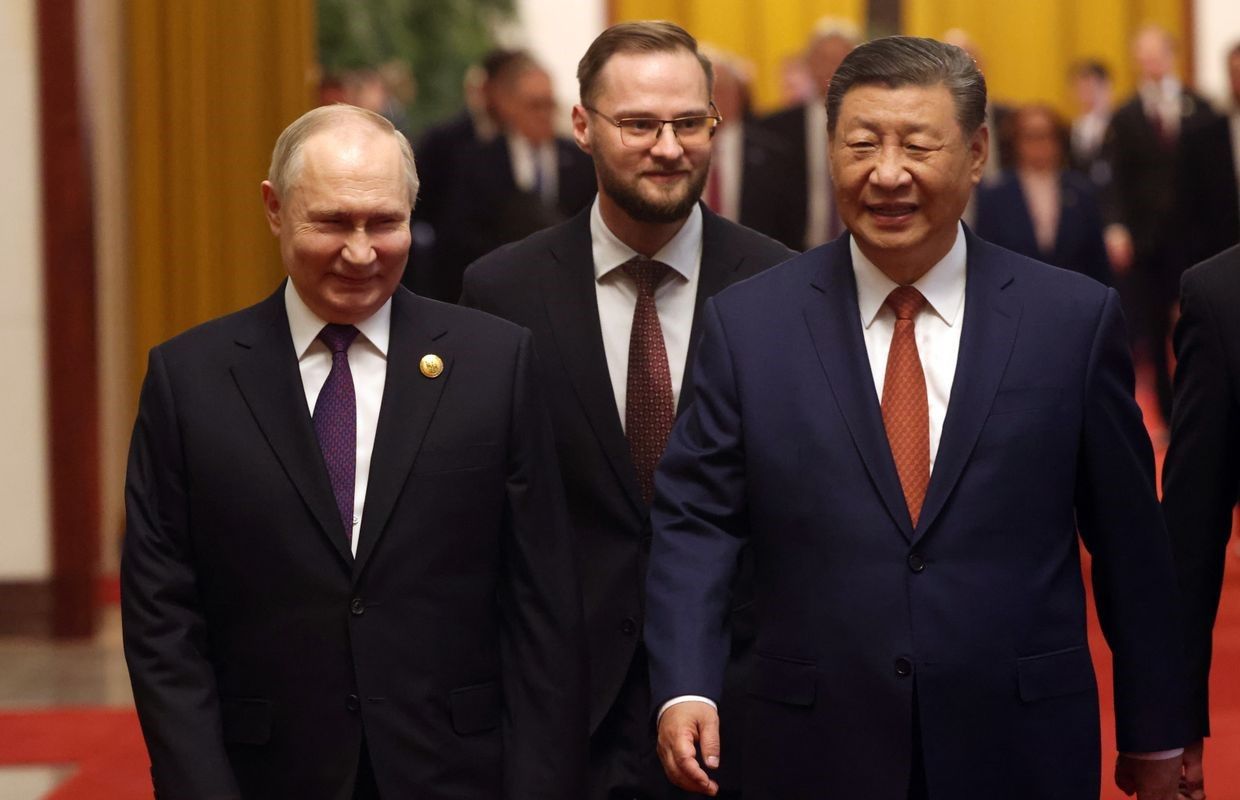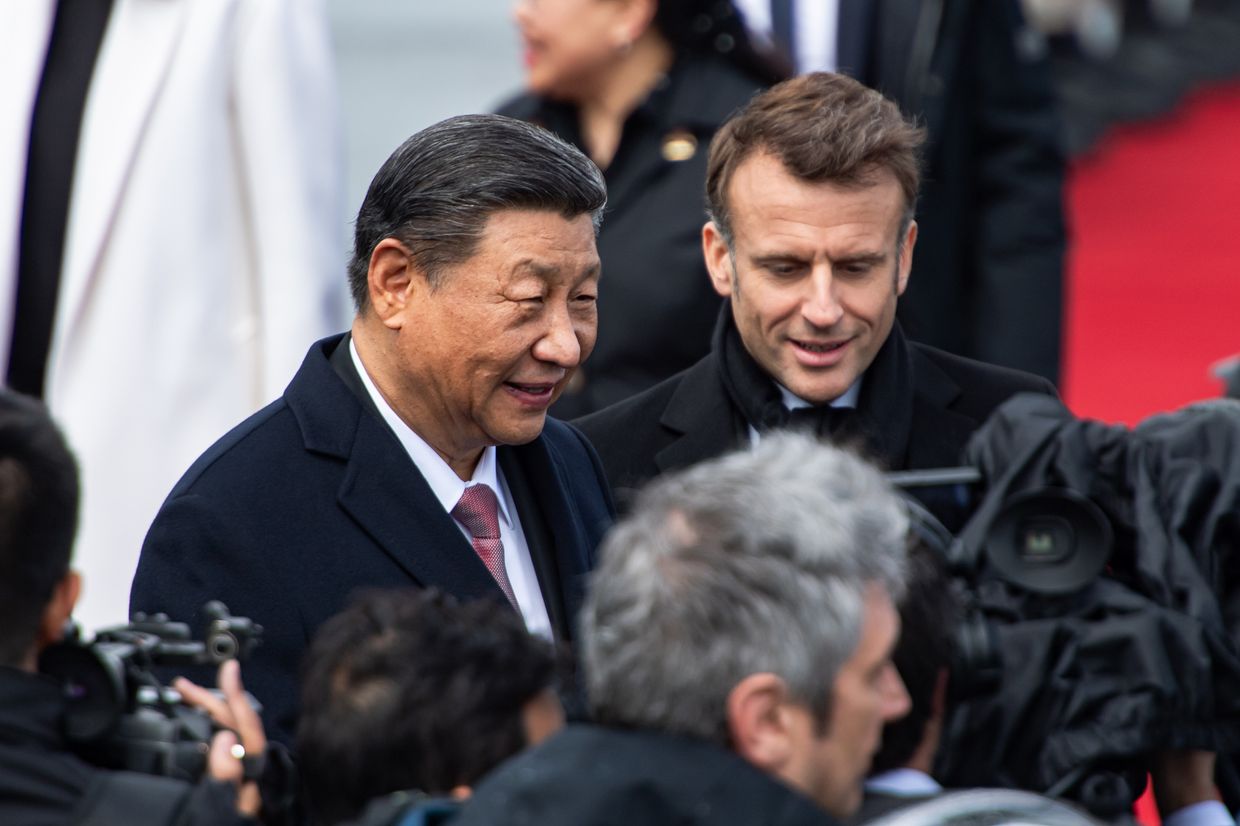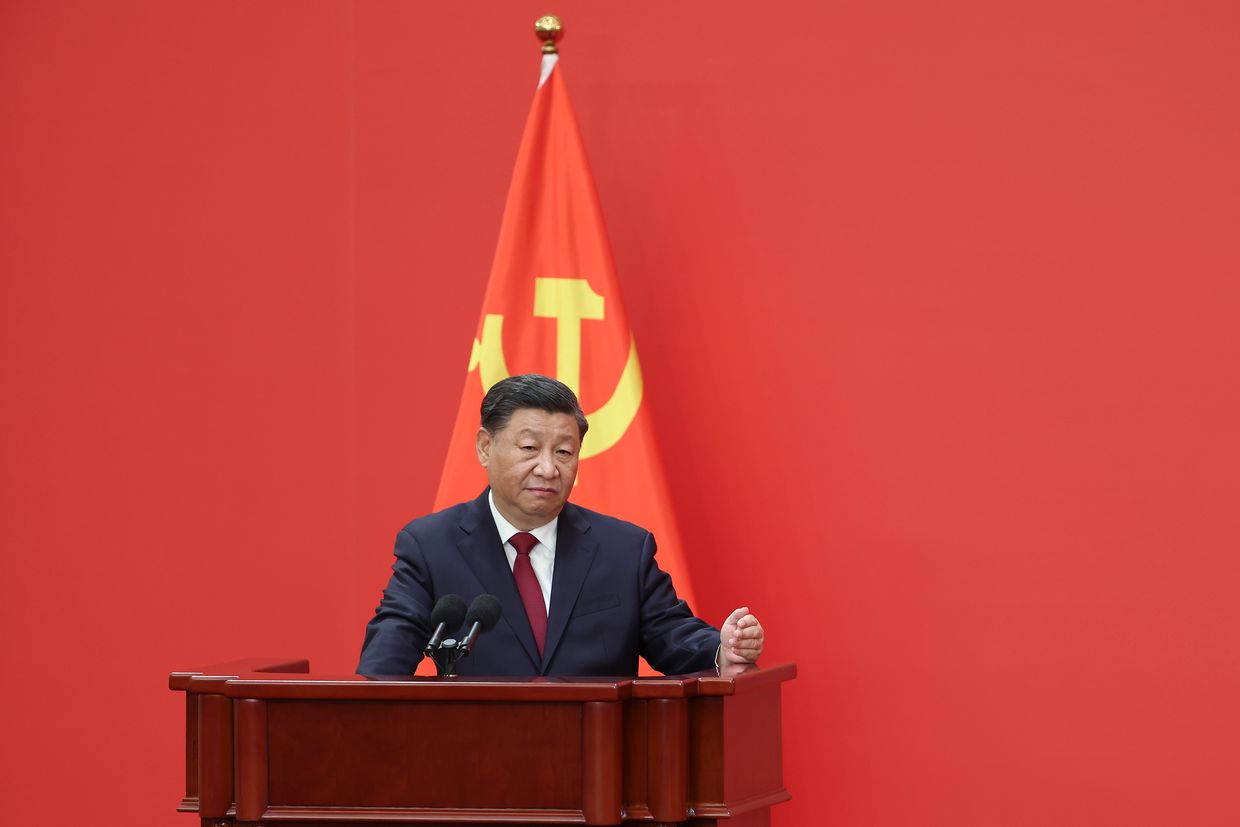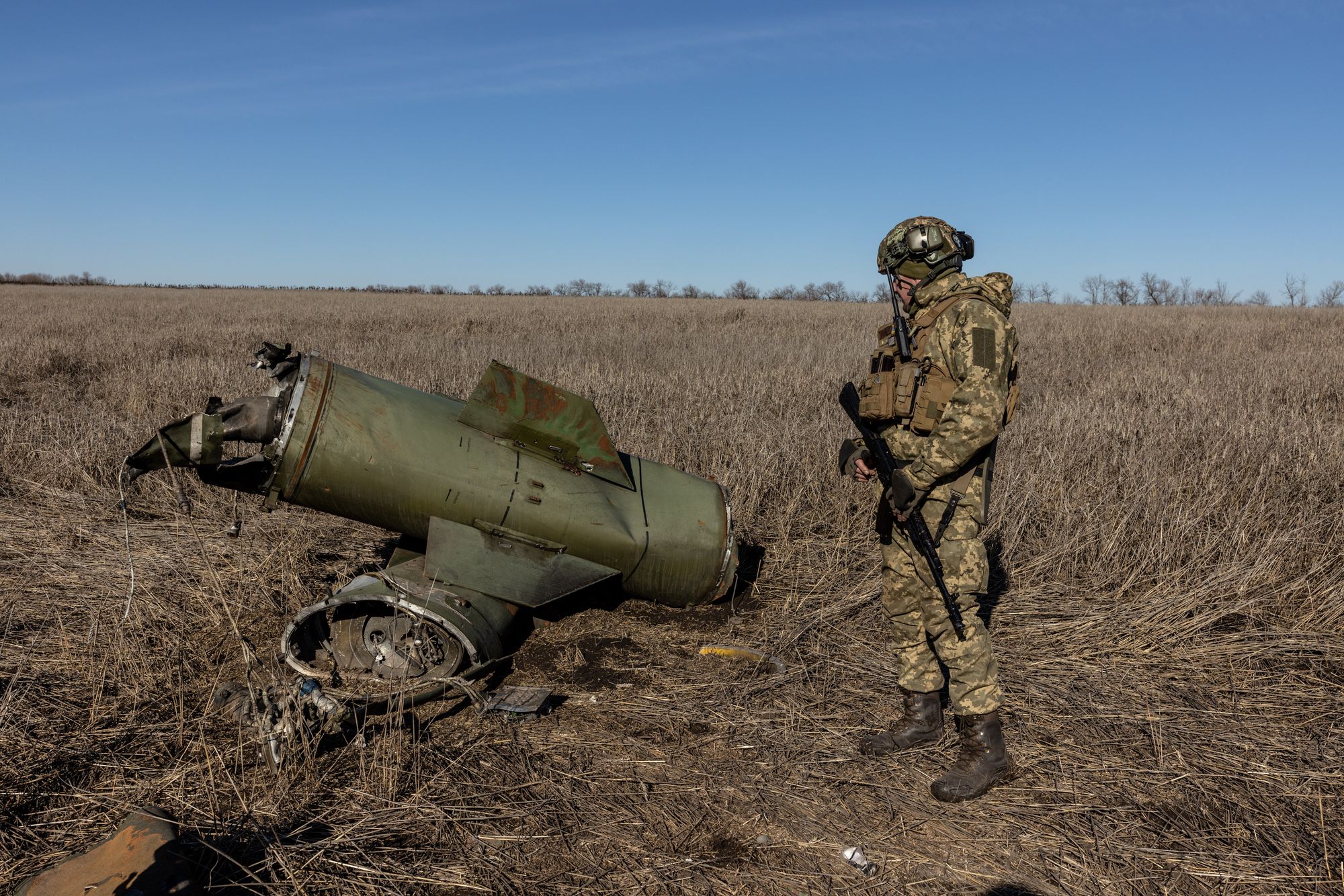Taiwan's FM: 'If Russia can do that to Ukraine, China might do the same to Taiwan'

Taiwanese Foreign Minister Joseph Wu during an interview at the Taiwanese Foreign Ministry in Taipei, Taiwan, on April 26, 2024. (Taiwan’s Foreign Ministry)
TAIPEI – The start of Russia’s full-scale war against Ukraine was a wake-up call for Taiwan, with the island nation believed to be the next conflict zone in case of Kyiv’s defeat.
Two years in, Taiwanese Foreign Minister Joseph Wu still believes that the island’s future is dependent on the war in Ukraine. Officials from across the aisle believe that Beijing will aim to “reunite” the two Chinas by force if Russia succeeds in Ukraine.
Trying to avoid a war at all costs, Taipei is attempting to walk a fine line. It defends its sovereignty while attempting to not provoke Beijing – first and foremost by not seeking de jure independence from the mainland.
“(One of Taiwan’s policies) is that we should not give authoritarian China any excuse to launch a war,” Wu said in an exclusive interview with the Kyiv Independent in late April.
Wu says that “a surprise attack” from China may be inevitable despite Taipei’s efforts to prevent it at all costs.
“The war may sometimes happen in a very surprising way, and I'm sure Beijing is planning for a surprise attack against Taiwan as well,” Wu said.
Bracing for the worst-case scenario, Taiwan is stockpiling weapons and building its own drones. It wants to show China that the invasion won’t be easy. Both Beijing and Taipei are learning from Russia’s war in Ukraine. They are also highly dependent on the eventual outcome, rooting for different sides.

For Taiwan, a 24-million-strong island whose de facto independence could be on the brink if China pulls the trigger, Ukraine’s defiance against Russia has served as a great example.
Russia’s war showed how far authoritarian states are willing to go and how dangerous it can be to rely on third parties for protection and military support when facing an existential threat.
Minister Wu said that international response is key to preventing authoritarian states from expanding further. He stressed that allowing them to get what they want would only leave them hungry for more.
“If you look at the Russian aggression against Ukraine, it didn’t start in 2022 – it started in Georgia (in 2008) and it started in Crimea (in 2014),” Wu said. “And because the Western countries did not help Ukraine in stopping Russia at the time, (Russian President) Vladimir Putin was encouraged to do it.”
“And right now, Europe and major democracies around the world understand that if we don't stop Russia in Ukraine, it may continue.”
Learning from Russia’s war
Just as China is studying Russia’s successes and mistakes on the battlefield, Taiwan is also closely observing Ukraine’s defense strategies – from the formation of local Territorial Defense Forces to drone warfare.
One of the lessons from the war in Ukraine is that “the autocracies or authoritarianism or dictatorship – they are not to be trusted,” as Russia has “no justification” for invading Ukraine, according to the minister.
“So our lesson is that if Russia can do that to Ukraine, China might do the same to Taiwan,” Wu said. “We need to build up our defense, and defense capability is the first deterrence against the aggression by the authoritarian country.”
Wu warned that it is not just Taiwan at risk, but neighboring nations as well – such as the Philippines that are similarly suffering from Chinese “threat and harassment.”
“If we are not able to stop the Chinese in Taiwan, then many other countries will be endangered,” Wu said.
But no matter how many lessons Moscow has shared with Beijing, theories could never replace experience, retired Australian Army Major General Mick Ryan said.

“All the simulation in the world doesn't mean anything until you're actually in the midst of fighting with your enemy because the Taiwanese will probably have a few surprises for the Chinese as well,” said Ryan, who is analyzing the war in Ukraine and the rising tensions over Taiwan.
And while there are many parallels between Ukraine's and Taiwan’s situations, geography is a differentiating factor that serves both as an advantage and disadvantage.
The 180-kilometer sea distance between mainland China and Taiwan is “a very difficult preposition” to launch a major operation against the island, Ryan said.
But Taiwan has no land neighbors willing to swiftly increase its support.
China’s provocations
While watching the war in Ukraine unfold from a distance, Taiwan is facing Chinese provocations every day.
Taiwan faces China’s so-called “gray zone” activities every day, which vary from military exercises near the island to cyber and disinformation warfare. Beijing denies the existence of the unofficial border that separates the two Chinas, regularly crossing into the territory de facto controlled by Taipei.

China has further intensified its campaigns in 2024, threatening the long-standing status quo over the Taiwan Strait, which separates Taiwan from mainland China.
For now, Taiwan is trying to combat Beijing’s provocations by patrolling the sky and sea to prevent Chinese aircraft or warships from crossing its territory, according to the minister.
“Right now, the Chinese activities are below the threshold of war, and their purpose is trying to crush the will of the Taiwanese people,” Wu said.
“What the Chinese are doing to us right now is trying to pressure Taiwan to its maximum capacity so that Taiwan would cave in to the Chinese pressure,” he added. “And at this stage, I think Taiwan needs to stand very firm against those kinds of ‘gray zone’ activities.”
U.S. Indo-Pacific Command Chief John Aquilino warned in March that China plans to be ready to invade Taiwan by 2027.
“On a scale not seen since WWII, the PLA (China’s People's Liberation Army) buildup is occurring across land, sea, air, space, cyber, and information domains,” the admiral said in a statement.
There is no officially announced plan of how Western nations would react in the case of a Chinese invasion. U.S. President Joe Biden has said that his country’s forces would defend Taiwan if Beijing attempted to take the island by force.
Faced with daily threats, Taiwan is not willing to take risks. To compensate for its growing but small domestic arms industry, Taiwan has been ordering U.S. weapons, further soaring Washington-Beijing tensions.

Stepping up its drone game is also important to Taiwan. Reuters’ 2023 investigation, citing an internal government document, revealed that Taiwan aims to produce more than 3,200 military drones by mid-2024, which range from small short-range variants to 150-kilometer-range surveillance drones.
This, it said, is to compete against China’s 2-million-strong army that has over 50 different types of drones estimated to number tens of thousands.
While pressuring Taiwan militarily, China is also trying to subdue its neighboring island on the diplomatic front.
Beijing is working hard to poach Taipei’s allies. Currently, Taiwan only has diplomatic ties with 12 countries. China won over Taiwan’s 10 diplomatic allies with economic and political incentives over the past eight years of the Democratic Progressive Party’s (DPP) rule.
Many are now incentivized by Beijing to cut their ties with Taipei.
Wen Lii, DPP’s director of international affairs, believes that Beijing is trying to manipulate public opinion in Taiwan.
Taiwan is always “fully on alert for any possible scenario,” and it understands that the island’s security is “primarily our own responsibility and that we cannot take any foreign assistance for granted,” Lii stressed.

“It's limiting Taiwan's international space, and the threat is still out there... They use that to hurt Taiwanese morale, to let Taiwanese understand that Taiwan has no foreign relations, (and that) Taiwan has no room to participate in the international organizations,” Minister Wu said.
Unofficial partnership
The 69-year-old career diplomat spoke to the Kyiv Independent at the ministry in central Taipei a few weeks before he is set to resign on May 20.
But Wu isn’t done, and will take on the role of Taiwan’s Security Council secretary-general, a position he held for a year before taking office as foreign minister.
Looking back at his six years as a minister, Wu said that his goal has always been to build Taiwan’s name even amidst international crises – from the COVID-19 pandemic to the war in Ukraine and in the Middle East.
“Those events may hurt Taiwan, just like those events hurting the rest of the international community,” Wu said. “But those were offering opportunities for Taiwan to be seen by the international community as a force for good.”
As soon as Russia launched its full-scale invasion, Taiwan followed the Western allies in imposing sanctions on Moscow and sending humanitarian aid to Ukraine.
Taiwan ranks forth among Indo-Pacific nations in commitments to Ukraine, after Japan, Australia, and South Korea. Taiwan provided more than $110 million in aid since February 2022.
But Taiwan’s most important support for Ukraine is its export ban on semiconductors. Moscow has been able to circumvent sanctions and import chips and machine tools for arms production via a third country, according to emerging media reports. Taipei said that export controls were tightened following the reports.
Asked whether Taiwan is considering military assistance for Ukraine, Wu said that it is unlikely for now since the island needs to focus on its own security.
The minister, however, agreed that Taiwanese drones could “benefit” Ukraine in theory and that the battlefield experience may be helpful for Taipei. He said that drone production is “still in the initial stage,” with the time frame for mass production of civilian and military drones still unclear.

Wu said that Taiwan has discussed with Ukraine how his country could assist wounded soldiers through the rehabilitation process, though indirectly, since the two don’t have formal diplomatic relations.
The minister promoted the idea of Ukraine opening a representative office in Taipei and that Taiwan would do the same in Kyiv. He explained that it is a two-sided agreement, and both sides opening an office would “benefit tremendously the bilateral relations.”
“(In the long run), I think we should think about the long-term friendship and institutionalize cooperation between Taiwan and Ukraine,” Wu said. “Of course, setting up institutions representing countries in each other's territory is probably the most important step to go.”
It remains a nearly impossible idea, as Kyiv is attempting to bring mainland China to its side. According to the sources of the Kyiv Independent in the president’s office, Kyiv has attempted to bring representatives of Beijing to the June Peace Summit in Switzerland to no avail.
“So, at this moment, we are not proposing this issue yet, but we are focusing on supporting Ukraine,” Wu said.
Taiwan supports Ukraine through municipality-level or NGOs, as well as through neighboring countries such as Poland, Slovakia, and Lithuania. Ukraine is reluctant to accept direct aid from Taiwan amidst Chinese claims over the island and the absence of official ties between the two nations, according to D.C.-based think-tank Global Taiwan Institute.
But Wu signaled hope in further growing Taiwan-Ukraine relations, adding that the two young democracies standing together is symbolic.
“Democracies around the world should unite with each other to prevent authoritarianism or dictatorship or autocracies from expanding further,” Wu said.














